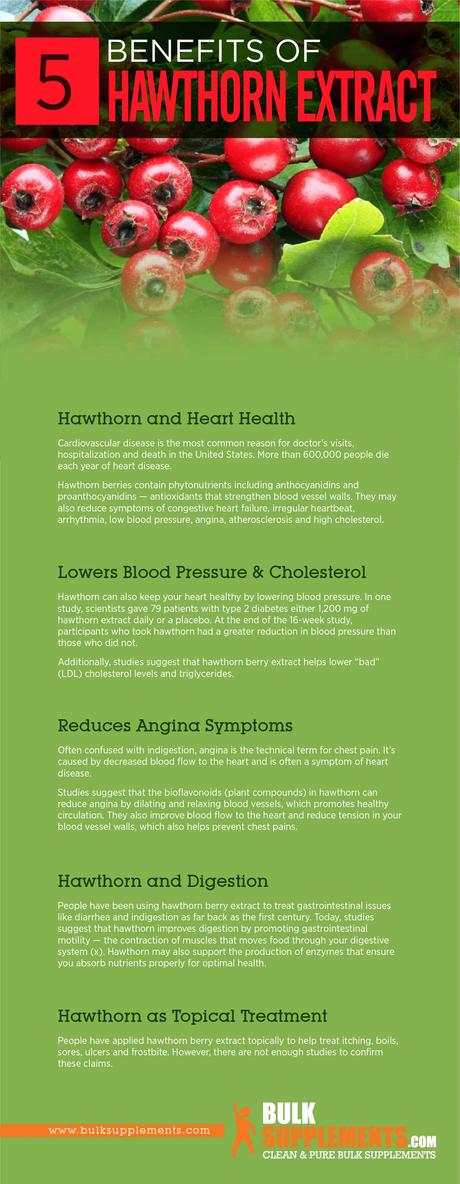What is Hawthorn Berry?
The hawthorn berry, also known as “haw,” has been a popular ingredient in desserts and wines and a key medicinal herb for thousands of years. In ancient Rome, it was used to relieve diarrhea. It’s also a staple herb in traditional Chinese medicine. In the Middle Ages, Europeans used it to keep their hearts healthy.
There are hundreds of species of hawthorn all over the world. Though they’re tiny, hawthorn berries pack a serious health punch, especially for your heart. They may also improve your exercise performance (x).
Hawthorn Berry Benefits
Hawthorn and Heart Health
Cardiovascular disease is the most common reason for doctor’s visits, hospitalization and death in the United States. More than 600,000 people die each year of heart disease (x).
Hawthorn berries contain phytonutrients including anthocyanidins and proanthocyanidins — antioxidants that strengthen blood vessel walls. They may also reduce symptoms of congestive heart failure, irregular heartbeat, arrhythmia, low blood pressure, angina, atherosclerosis and high cholesterol (x).
Research suggests that hawthorn berry extract significantly benefits heart health when compared to a placebo (x). In one study, researchers gave 78 patients with heart failure 200 mg of hawthorn three times daily for two months. At the end of the trial, patients experienced an improvement in working heart capacity and a reduction of their heart disease symptoms (x). In fact, hawthorn berry was nearly as effective as prescription heart medication in reducing symptoms — and it had fewer side effects (x).
Lowers Blood Pressure & Cholesterol
Hawthorn can also keep your heart healthy by lowering blood pressure. In one study, scientists gave 79 patients with type 2 diabetes either 1,200 mg of hawthorn extract daily or a placebo. At the end of the 16-week study, participants who took hawthorn had a greater reduction in blood pressure than those who did not (x).
Additionally, studies suggest that hawthorn berry extract helps lower “bad” (LDL) cholesterol levels and triglycerides (x).
Reduces Angina Symptoms
Often confused with indigestion, angina is the technical term for chest pain. It’s caused by decreased blood flow to the heart and is often a symptom of heart disease.
Studies suggest that the bioflavonoids (plant compounds) in hawthorn can reduce angina by dilating and relaxing blood vessels, which promotes healthy circulation. They also improve blood flow to the heart and reduce tension in your blood vessel walls, which helps prevent chest pains (x).
Hawthorn Berry and Digestion
People have been using hawthorn berry extract to treat gastrointestinal issues like diarrhea and indigestion as far back as the first century (x). Today, studies suggest that hawthorn improves digestion by promoting gastrointestinal motility — the contraction of muscles that move food through your digestive system (x). Hawthorn may also support the production of enzymes that ensure you absorb nutrients properly for optimal health (x).
Hawthorn as Topical Treatment
People have applied hawthorn berry extract topically to help treat itching, boils, sores, ulcers and frostbite. However, there are not enough studies to confirm these claims (x).

Herbal Allies
Hawthorn can be effective when used in combination with various other supplements. Coenzyme Q10 may lower instances of heart disease during the early stages when combined with hawthorn. Ginkgo Biloba can be used with hawthorn to improve blood circulation and ensure sufficient oxygenation to the brain. Garlic (Allium sativum) and arnica (Arnica montana) can help to treat instances of angina and low blood circulation. Lemon Balm (Melissa Officinalis) and St. John’s wort are also used in combination with hawthorn to calm the nerves and induce sleep for insomnia.
Side Effects and Dosage
Hawthorn is considered to be a safe supplement for adults. However, there are rare side effects that include upset stomach, headache or dizziness (x, x).
Moreover, hawthorn berry extract may interact with prescription medications. If you are taking any medications that affect and treat the heart, consult your physician before taking this supplement. Also, if you have high blood pressure, are taking beta-blockers and calcium blockers, male enhancement drugs that dilate vessels or any medications that increase blood flow levels to the heart, you should consult your doctor before taking this supplement. Hawthorn is also contraindicated for people who are taking digoxin (x). Women who are pregnant may also want to avoid using hawthorn berry because it could possibly reduce uterine tone (x).
As a supplement, it is best to take 1,200 mg or half a teaspoon, once or twice per day, or as directed by your doctor (x). Also, you can safely take hawthorn berry extract over a period of 16 weeks (x).
The Bottom Line
Hawthorn berry extract is touted as a heart health herb. Research has shown it to contribute to the overall health of the cardiovascular system. This is especially true for those who suffer from angina, congestive heart failure, high or low blood pressure and other heart-related health issues. European doctors have been prescribing hawthorn for use under medical supervision for many years, although not so much among American doctors. Overall, this little red berry is a helpful ally in heart health and you might do well to add this supplement to your regular diet.
